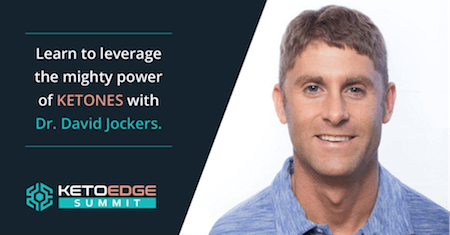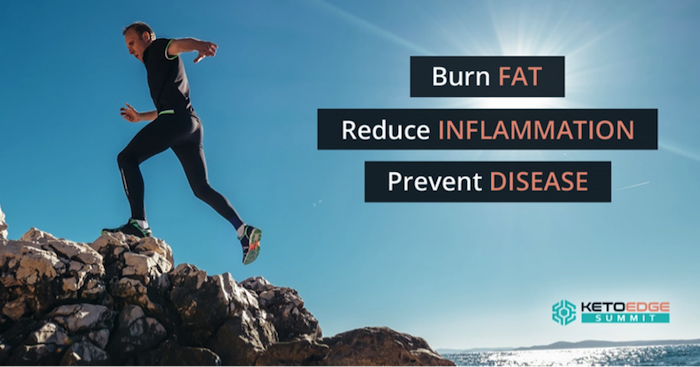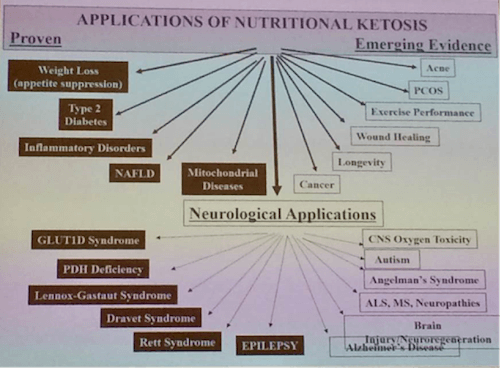
I wasn’t aware until recently that “KETO”, “Ketones” “Keto diet”, “Ketogenic lifestyle”, “Ketosis” and “Ketogenic diet” are some of the MOST SEARCHED terms on the internet today.
But there is a good reason for this and host of The Keto Edge Summit (which runs from May 7-13, 2018), Dr. David Jockers shares this:
The goal of the ketogenic lifestyle is to adapt the body to utilize FAT as its primary fuel source instead of SUGAR.
For our ancestors, eating three meals a day just wasn’t a thing. Instead, they’d hunt and forage for the foods they could find. When there wasn’t food, they wouldn’t eat.
Sometimes they’d go for days without food. To sustain life during times of scarcity, the body is thought to have developed the ability to utilize fat as an alternative fuel source.
Today, there’s an abundance of food available to most of us at all times. We regularly eat three meals per day with intermittent snacking between them.
This kind of frequent eating, along with an overemphasis on carb-rich and sugary foods, causes a REDUCED ability to burn fat. Because we don’t have to hunt or forage for food; we’ve become “sugar burners.”
As these sugar-laden foods damage our bodies, we rely MORE on sugar and lose the ability to produce ketones – as a result, massive blood sugar spikes, inflammation, hormone imbalance and ultimately many of the chronic diseases that plague us today.
In a traditional nutrition course, you’d learn that sugar is the body’s PRIMARY fuel source, while fat is secondary. What we’ve learned now (and so much research is supporting this) fat can be a healthier and more sustainable source of energy.

Ketones help you burn fat for energy, powerfully reduce inflammation and show promise in preventing and eradicating diabetes, cancer, autoimmune and neurodegenerative diseases like Alzheimer’s and Parkinson’s, and they can even play a role in alleviating symptoms in mental health conditions like anxiety, depression and schizoaffective disorder.
One of the amazing speakers on the summit is Dominic D’Agostino, researcher and Associate Professor at the University of South Florida. I attended the Bioceuticals conference in Melbourne this past weekend and had the pleasure of hearing him present on this topic live and all I can say is wow! I don’t want you to miss out and now you don’t have to when you tune in via the Keto Edge Summit.
Here is one of the slides where he shares the many proven and emerging applications of nutritional ketosis:
The applications of nutritional ketosis are extensive – including epilepsy, type 2 diabetes, weight loss, NAFLD, mitochondrial disease and inflammation, with emerging evidence for acne, PCOS, wound healing, cancer, autism, ALS, MS, Alzheimer’s, the brain and anxiety.

I shared these case studies a few weeks ago in a blog post – Ketogenic diet: reductions in auditory hallucinations and delusions, better mood and energy, and weight loss. Two schizoaffective patients working with Dr. Chris Palmer, a psychiatrist from Harvard’s McLean Hospital in Belmont, Massachusetts, tried a ketogenic diet for weight loss:
- After four weeks on the ketogenic diet, the female patient had resolution of her delusions and lost ten pounds.
- The male patient experienced similar results with “dramatic” reductions in auditory hallucinations and delusions, as well as better mood and energy. He also lost weight, losing 104 pounds over the course of a year.
There is also research reporting the following results:
the patient’s behavior and intellect improved in regard to hyperactivity, attention span, abnormal reactions to visual and auditory stimuli, usage of objects, adaptability to changes, communication skills, fear, anxiety, and emotional reactions
ketone supplementation may represent a promising anxiolytic strategy through a novel means of inducing nutritional ketosis.
As Dr. Jockers states:
The GREATEST health discovery of this century may ALREADY be inside your body!
During this health summit, you’ll discover:
- What is ketosis (and how does it work)?
- Myths, and how to separate fact from fiction!
- How to overcome the challenges of being “keto adapted.”
- Whether you should start a keto diet (or not!).
- How to shop, live and eat on a ketogenic lifestyle.
The Keto Edge Summit is online and available at no-cost from May 7-13, 2018! Register here
I will be in learning mode with you for the Keto Edge Summit. I’ve been following Dr. David Jockers for awhile and I’m very excited about the applications of a ketogenic diet for anxiety and depression, given what we’ve learned so far. It’s going to be a great educational opportunity for all of us.
Have you experienced benefits from a ketogenic diet? If yes please do share what benefits?
If you’ve had challenges being on a ketogenic diet please share those challenges too, so we can all learn.
I first used the ketogenic diet 18 years ago to lose pregnancy weight and used it again after four subsequent pregnancies. From ages 32 to 42 it worked extremely well for weight loss, and I enjoyed all the benefits listed. However, since 42, it does not seem to work at all and now at 49 I am 25+ pounds overweight and unable to lose at all with a ketogenic diet that has easily worked for me in the past. Does one become unable to get into ketosis at some point? Additional attempts have only resulted in more weight gain. What could be the barriers preventing ketosis in my situation? I have addressed other issues like thyroid function, vitamins and minerals, exercise, etc.
Amy
These are questions I’d be asking: what your diet looks like and the timing of intermittent fasting/eating, and what tools you are using to determine if you’re in ketosis; what your diet look like when you’re not trying to get into ketosis; what did it look like after your pregnancies ie how long did you do it for and if you did any cycling on and off?
You mention thyroid health is ok but I’d want to check adrenal health (a 4 collections saliva test) and sex hormone status (regular periods? PMS? cravings? etc). I’d also want to know what exercise you do? Any toxin exposure you’re aware of – metals? smog? pesticides? and any MTHFR polymorphism that may be affecting detox capability?
I encourage you to sign up for the summit and post your question on some of the speaker pages too. Dr. Anna Cabecca is speaking specifically about women and the keto diet and some of the challenges we face.
My daughter, a fully-scholarshipped Oxford PhD student, developed a mental illness which caused her to have to drop out of her program and end up in psychiatric hospitals three times last year. She was psychotic, delusional, talked to spirits, thought my husband and I were trying to kill her, etc, and was ultimately diagnosed with Bipolar 1 with psychosis. An injection of Invega brought her back to her senses after eight months of psychosis, but that, and other drugs she tried over a 4-month period, had unbearable side effects. I ordered supplements which were touted to help people with mental health issues, which seemed to stabilize her, but not totally (she plunged into suicidal depression, really scary).
A friend recommended the ketogenic diet. She started it in November and has been following it faithfully ever since. She has been med-free for seven months, and is totally back to her brilliant, normal self. She has not resumed her research career, but instead has devoted herself to developing the best keto cookies, cakes and muffins out there (we’ve tried the rest, hers are way better). She has literally taught herself how to be a food scientist and I would say she’s the world’s leading expert now in the use of almond flour, sugar alcohols, and the other specialized ingredients that go into creating a perfect keto treat. She’s about to launch her business, and I think it will be really successful. All this to say, I attribute her remarkable recovery primarily to the keto diet, and I’m so grateful she was advised to try it. She’ll eat this way for the rest of her life, as we’re sure this is what has restored and maintains her mental health.
Dawn
Thanks for sharing your daughter’s powerful recovery story on the ketogenic diet! I’m so happy for her, for you and your family. I commend her for turning things around to help others and I wish her much success in her new business. Offering occasional treats made with real whole food and teaching folks how to make them is wonderful!
In case you missed one of my earlier blogs (and for others reading these comments) I shared 2 case studies about a man and woman using a ketogenic diet for weight loss and then recovering from schizoaffective disorder here https://www.everywomanover29.com/blog/ketogenic-diet-reductions-in-auditory-hallucinations-and-delusions-better-mood-and-energy-and-weight-loss/
Food truly is medicine when I read case studies like this and hear your daughter’s story!
I really don’t want to post anything negative but it would be remiss of me not to caution her about the use of almond flour in baking and consuming these baked goods on a daily basis because of the high copper intake this may lead to, affecting zinc levels and increasing anxiety (and other low zinc/high copper symptoms) in many individuals. I’ve seen this a great deal with clients who adopt the Paleo diet/low carb way of eating and ramp up on baked almond flour goodies a few times a day.
Needing a daily treat and baked goodies is also a topic of concern for me with the Paleo/low carb/ketogenic communities. I actually have a series of questions about the ketogenic diet in the above blog and one of them addresses the need for bakes goods and feeling deprived on a ketogenic diet: “How do we help individuals make the switch to this way of low carb eating and help them maintain so they don’t feel deprived and are not relying on willpower alone? The diet can be challenging to sustain and slip ups are common. If you are eating enough healthy fats (and it’s a lot more than you’re used to eating), this typically helps with cravings. If you still have cravings and feel you are deprived and missing out on treats, the targeted individual amino acids offer powerful results: tryptophan (for afternoon cravings), GABA (for stress eating), DPA (for comfort eating), tyrosine (when there is low motivation) and glutamine (for low blood sugar cravings).”
I wonder if your daughter would research the work of Dr Abram Hoffer and the use of B vitamins esp. B3 for mental illness.
Frances
Thanks for sharing this wonderful resource. Dr Abram Hoffer’s work with B3 is still groundbreaking and is always something to consider as are all the dietary and nutritional approaches like a grain-free diet or gluten-free diet or addressing the mcirobiome or even looking at pyroluria and/or low or high histamine (Carl Pfeiffer’s work).